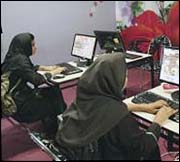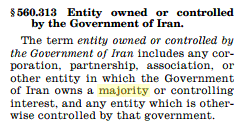 Last week, the Office of Foreign Assets Control (“OFAC”) issued an interpretative guidance on section 560.545 of the Iranian Transactions Regulations which permits exports from the United States to Iran of services incidental to the exchange of personal information over the Internet. The rule requires that such services be “publicly available at no cost to the user.” The guidance gives some examples that seem to have been obviously covered even without the guidance:
Last week, the Office of Foreign Assets Control (“OFAC”) issued an interpretative guidance on section 560.545 of the Iranian Transactions Regulations which permits exports from the United States to Iran of services incidental to the exchange of personal information over the Internet. The rule requires that such services be “publicly available at no cost to the user.” The guidance gives some examples that seem to have been obviously covered even without the guidance:
- Personal Communications (e.g., Yahoo Messenger, Google Talk, Microsoft Live, Skype (non-fee based))
- Updates to Personal Communications Software Personal Data Storage (e.g., Dropbox)
- Browsers/Updates (e.g., Google Chrome, Firefox, Internet Explorer)
- Plug-ins (e.g., Flashplayer, Shockwave, Java)
- Document Readers (e.g., Acrobat Readers)
- Free Mobile Apps Related to Personal Communications
- RSS Feed Readers and Aggregators (e.g., Google Feed Burner)
More significant is what the guidance has to say about paid services which aren’t covered by section 560.545. According to the guidance, fee-based personal communications are now covered by the favorable licensing policy set forth in the Statement of Licensing Policy On Support of Democracy and Human Rights in Iran. Specifically, this favorable policy will cover paid web hosting services, paid mobile apps and paid internet communications services such as Skype and Google Voice. The policy also covers payment to Iranians in connection with online advertising on Iranian websites.
This all laudable, but it seems unlikely that anyone will be able to take advantage of these new policies. Specifically, how are Iranians going to pay for these services without routing them through one of the many designated Iranian banks? All such payments will wind up being blocked. Even if the payments are somehow routed only through the few banks that are not designated, it’s not clear how the transfers from individual Iranians will be able to reference the specific licenses to avoid being rejected by U.S. banks.
So although Iranians might find some comfort in OFAC’s lip service on democracy in Iraq, it will be cold comfort if they actually try to obtain the paid services in question.

 Posted by
Posted by  Category:
Category: 

 A number of news reports, like
A number of news reports, like 
 Well, even the White House now knows, and presumably the folks at the Office of Foreign Assets Control now know, that the Syrian dictator with the silly moustache, Bashar al-Assad, was possibly circumventing U.S. sanctions when he
Well, even the White House now knows, and presumably the folks at the Office of Foreign Assets Control now know, that the Syrian dictator with the silly moustache, Bashar al-Assad, was possibly circumventing U.S. sanctions when he 
 So, this afternoon, I was on the phone with a client who had a question about the Cuba sanctions enforced by the Office of Foreign Assets Control (“OFAC”). As I often do in these situations, I went to the OFAC site to pull up the Cuban sanctions regulations themselves and, poof, they were gone. The hyperlink on
So, this afternoon, I was on the phone with a client who had a question about the Cuba sanctions enforced by the Office of Foreign Assets Control (“OFAC”). As I often do in these situations, I went to the OFAC site to pull up the Cuban sanctions regulations themselves and, poof, they were gone. The hyperlink on 

